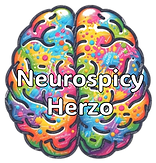Unmasking Neurodivergent Overwhelm: Skills and Tips for Embracing Unique Needs and Finding Community Support
- neurospicyherzo
- Sep 19, 2024
- 2 min read
In a world filled with diverse experiences and perspectives, neurodiversity shines as a colorful tapestry of individuality. However, for many neurodivergent individuals, navigating societal expectations and norms can often lead to overwhelm, particularly when masking one's true self to fit in. This blog post delves into valuable skills and tips for managing and preventing neurodivergent overwhelm, shedding light on the importance of acceptance, understanding, and building a supportive community.
Embracing Your Unique Needs
Masking, the practice of camouflaging one's neurodivergent traits to appear more neurotypical, can significantly contribute to a sense of overwhelm. While masking may provide temporary relief in social situations, the long-term effect can be mentally and emotionally draining. It is crucial to acknowledge that just because a coping mechanism or strategy works for some, it does not imply universal effectiveness. Each neurodivergent individual is unique, with distinct needs and challenges that require personalized approaches.
Tips for Managing Overwhelm
Self-Acceptance : Embrace your neurodivergent identity unapologetically. Recognize that your differences are what make you special and valuable.
Self-Care : Prioritize self-care activities that help you recharge and unwind. Establish boundaries to protect your energy and well-being.
Communication : Advocate for yourself by communicating your needs and boundaries clearly to others. Open, honest communication is key to fostering understanding and acceptance.
Sensory Regulation : Create a sensory-friendly environment tailored to your preferences. Incorporate sensory tools or techniques that help regulate your sensory experiences.
Skills for Preventing Overwhelm
Mindfulness : Practice mindfulness techniques to stay grounded in the present moment and manage anxiety or sensory overload effectively.
Stress Management : Develop healthy coping mechanisms to address stress triggers proactively. Engage in activities that promote relaxation and emotional well-being.
Routine Building : Establish a predictable routine that provides structure and stability in your daily life. Routine can help reduce uncertainty and increase feelings of control.
Finding Community Support
Navigating neurodivergent overwhelm can be a challenging journey, but the presence of a supportive community can make a significant difference. Surrounding yourself with individuals who understand and accept you for who you are can offer comfort, validation, and encouragement during difficult times.
Building a Supportive Network
Online Communities : Explore online platforms and social media groups dedicated to neurodiversity. Connect with like-minded individuals, share experiences, and seek advice or support.
Support Groups : Join local support groups or organizations that cater to neurodivergent individuals. Attend group meetings, workshops, or events to foster connections and build a sense of belonging.
Therapeutic Resources : Engage in therapy or counseling sessions with professionals experienced in supporting neurodivergent individuals. Therapy can provide a safe space to explore personal challenges and develop coping strategies.

Embracing Your Authentic Self
In conclusion, managing and preventing neurodivergent overwhelm requires a multifaceted approach that includes self-acceptance, self-care, effective communication, and community support. By unmasking your true self, embracing your unique needs, and fostering a supportive network, you can navigate the complexities of neurodiversity with confidence and resilience. Remember, you are not alone on this journey – together, we can create a more inclusive and understanding world for all neurodivergent individuals.
Let's empower each other to shine brightly in our beautiful diversity!




Comments